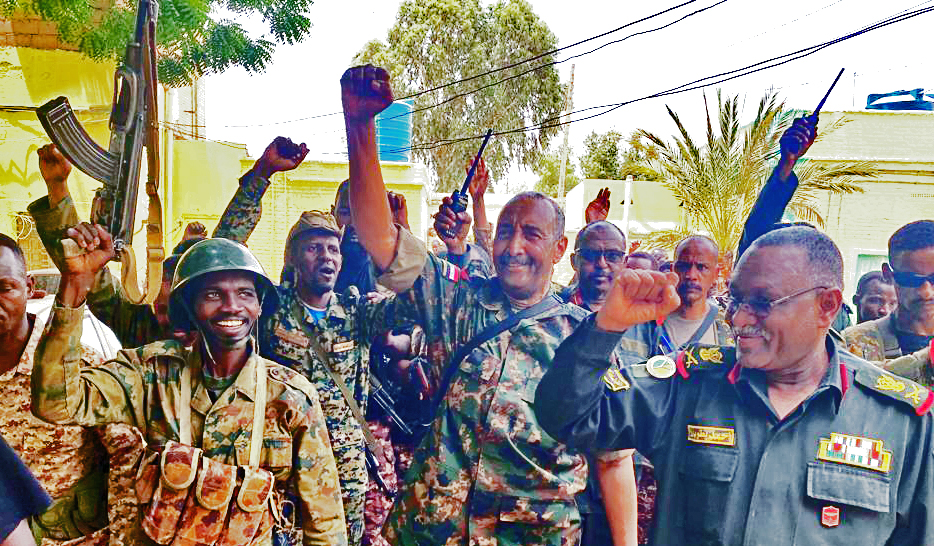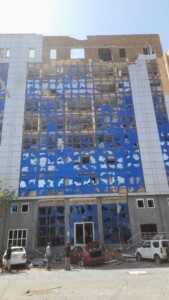‘Cautious calm’ in Sudan capital on second day of extended truce

Commander-in-Chief of the SAF Lt Gen Abdelfattah El Burhan (centre) inspects troops in Khartoum in late May (SUNA)
KHARTOUM –
Much of the Sudanese capital of Khartoum reported a ‘relative calm’ on Tuesday, following the signing of a five-day extension to the ceasefire by representatives of the warring Sudan Armed Forces (SAF) and the paramilitary Rapid Support Forces (RSF) in Jeddah on Saudi Arabia on Monday evening.
Co-facilitators of the agreement, Saudi Arabia and the USA, confirmed in a joint statement that both sides agreed that discussing a long-term ceasefire could entail the evacuation of troops from urban areas, including civilian homes.
The parties pledged to continue to abide by the terms of the May 20 ceasefire and humanitarian arrangements, on the basis of observations during the first period of the ceasefire. The parties stressed the need for more time to discuss these conditions and prepare for their implementation.
The facilitators said both sides agreed to fully implement the provisions of the first ceasefire, including delivering more humanitarian aid, facilitating the repair of basic services, and evacuating armed personnel from hospitals. They condemned continued air strikes, attacks, and banned movements, and stressed the need to remove further obstacles to the free movement of civilians and humanitarian assistance, and to enable government employees to resume their duties.
SAF
Lt Gen Abdelfattah El Burhan, Commander-in-Chief of the SAF, highlighted that the army agreed to extend the truce “in order to facilitate the flow of services to the public”.
During the inspection of the army forces in and around Khartoum, El Burhan said that “the armed forces will be forced to use their full lethal force,” in the event that what he termed the enemy [referring the RSF] “does not respond to the voice of reason”.
He claimed that “all areas and divisions across the country remain under the control of the military,” and ridiculed RSF notions that the war is directed against the kezan* and asked:“Where are the kezan among these soldiers?” He stressed that the armed forces are fighting this battle on behalf of their people.
RSF
A statement by the office of the official RSF spokesman this morning, says: “Despite the failure of the SAF to cease hostilities, the RSF unconditionally backs the Saudi-US initiative. The recent SAF violations have not deterred us from honouring our commitments.”
The RSF asserts that its focus “remains firmly on addressing the humanitarian crisis in Sudan by maintaining public safety by bringing the perpetrators to account and safeguarding civilians, infrastructure, and essential services; cooperating with the relevant entities to restore vital services, including water, electricity, medical care, and communications; calling for the establishment of a joint committee involving the Red Cross and medical associations to ensure hospital readiness; and striving to open channels for humanitarian aid delivery in line with the provisions of the Saudi-US initiative.
“We are committed to ensuring a peaceful and prosperous Sudan, with a democratically elected, civilian-led government operating at its helm. We will realise this dream together with the people of Sudan, no matter the challenges put forth by the SAF and its backers from the former regime of military dictator Omar al-Bashir” the RSF statement concludes.
* Kezan is a pejorative nickname used by many Sudanese to refer to Islamist loyalists to the regime of Omar Al Bashir (1989-2019) and who enjoyed far-fetching privileges during his rule. The word is the plural of koz which means ‘wooden or iron mug’. The nickname is based on a description the Islamic Brotherhood called themselves, when the founder of the group, the Egyptian Hasan El Banna, said “Religion is a sea, and we are the mugs that draw from it”.











 and then
and then